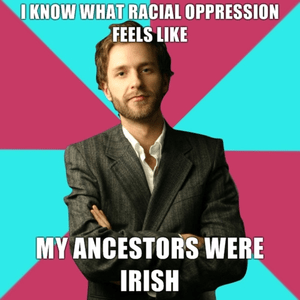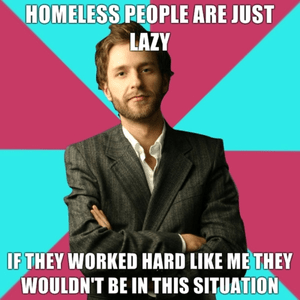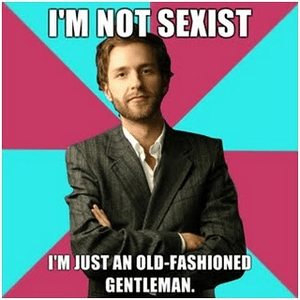Owning Our Jewish Privilege
A new meme blog is taking off. "Privilege Denying Dude" represents the type of person who denies that they have privilege, usually the privilege that comes with being white, male, heterosexual, cisgendered (not transgendered), and American. It identifies the sorts of phrases and ideas that are used to deny this kind of privilege, like the idea that homeless people are lazy.
Who is "Privilege Denying Dude?" He is fictional, of course, but his bio reads:
"Look, I wasn't around when all that bad stuff happened. All I know is I got to where I am solely by hard work. Discrimination? I'm not going to listen to this. You obviously can't hear me: my reality is the only reality."
The meme uses a stock image photo of "your average young, white guy" and uses an online image editor to allow people to write captions on the photo and submit them to the blog.
The blog is hosted by Tumblr, which provides an easy platform for remixing, commenting, reblogging, sharing, and discussion. And what's really exciting about "Privilege Denying Dude" is that it has opened the door for many to discuss the idea of privilege, which is something most people with privilege don't usually think about. It's a great example of how technology can help foster meaningful discourse through collaboration and feedback.
Naturally, this meme has made me think about my own privilege and also the privilege that often comes along with being a Jewish American in the 21st Century. If there was a "Privilege Denying Jewish Dude," what would his captions read?
I know what racism feels like. I've experienced anti-Semitism.
Diversity is about them accepting us as Jews.
Sure I want to help people in Darfur, but their genocide isn't the same as our genocide.
News article about racism? But what about anti-Semitism?
And to take it down another level, some Jews are more privileged than others within the Jewish community.
My Jewish identity is the only Jewish identity.
I'm not sexist. The Torah says women are equally important as men, but their innate gifts are better suited to the home.
Privilege is an issue that we, as Jews, need to acknowledge. One of the lesson plans in JWA's new civil rights curriculum, Living the Legacy, impressed me by exploring the relationship between power, privilege and social justice activism. This type of self-analysis will be critical as the Jewish community continues to embrace and rally around social justice causes and Tikun Olam. Yes, our history as an oppressed people is important and informs our mission to repair the world -- but we cannot act as though Jews are still oppressed in the U.S. We cannot act as though our suffering trumps the suffering of others or that today's oppressed minorities face the same challenges our ancestors did.
Denying our own privilege, as we can see from "Privilege Denying Dude," will only serve to prevent us from relating to others, communicating with others, and being effective in our social justice activism.
In the spirit of remixing, what else might "Privilege Denying Jewish Dude" say? Leave your additions in the comments!










While I think this is a really important conversation to initiate, I don't think you can talk about Jewish privilege without recognizing how it operates in the issue of Israel/Palestine and discourse about the conflict in the U.S. Because Israel and Zionist communities in the U.S. focus so strongly on what is best for Jews, it is almost only Jewish perspectives on Israel and the occupation that are taken seriously. Take for example how JStreet would not allow Palestinian speakers at their conference let alone at most events, but will let Jewish speakers talk about Boycott, Divestment, and Sanctions. Similarly, Israel grants Jews many privileges that it does not allow to go to Palestinians, such as the Jewish-specific "Law of Return" to any Jew regardless of familial or legal attachment to Israel- while millions of Palestinian refugees around the world are prevented from returning to where their families came from within Israel. There is much more to say about this and I hope readers will engage with this core element of Jewish privilege today.
Judith's essay on American Jews, Race, and Identity may also be of interest to readers of this post. The essay touches on both how Jews became white in the United States and the fact that, of course, not all American Jews are white.